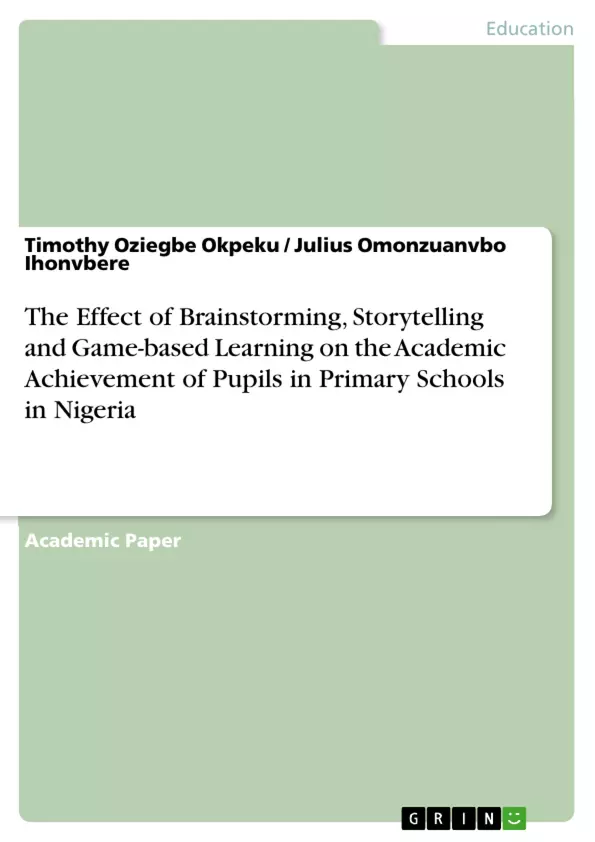Imagine a classroom where learning isn't a chore, but an adventure. This groundbreaking study delves into the heart of Nigeria's primary education crisis, where alarmingly, a staggering 75% of pupils struggle with basic literacy and numeracy, painting a stark picture of underachievement and highlighting the urgent need for transformative educational strategies. Challenging the status quo of conventional lecture-based teaching, this research rigorously investigates the impact of innovative, student-centered methodologies – specifically, the dynamic trio of brainstorming, storytelling, and game-based learning – on academic performance in Basic Science and Technology. By meticulously comparing these alternative approaches to traditional methods, the study seeks to unearth the potential for a paradigm shift in learning outcomes. It meticulously addresses the critical gap in existing research, focusing squarely on the Nigerian context and providing empirical evidence of how these engaging techniques can revolutionize the educational experience, foster deeper understanding, and ignite a passion for science and technology in young minds. This study is more than just an academic exercise; it's a beacon of hope, offering concrete, evidence-based solutions to combat underachievement, empower educators, and unlock the full potential of Nigerian primary school pupils. The findings illuminate pathways to improved teaching pedagogies, resource optimization, and enhanced teacher training, paving the way for a brighter future where every child has the opportunity to thrive academically. This exploration into alternative teaching methods like brainstorming, storytelling, and game-based learning offers a compelling narrative for educators, policymakers, and anyone invested in the future of education in developing nations, providing invaluable insights into how to transform classrooms into vibrant hubs of learning and discovery and addressing the core issues hindering academic success in Nigeria. Keywords: brainstorming, storytelling, game-based learning, academic achievement, pupils, science, technology, Nigeria, primary education, teaching methods, conventional teaching, learning outcomes.
Inhaltsverzeichnis (Table of Contents)
- Introduction
- Problem Statement
- Methodology
- Results
- Discussion
- Conclusion
Zielsetzung und Themenschwerpunkte (Objectives and Key Themes)
This study aims to investigate the impact of brainstorming, storytelling, and game-based learning on the academic achievement of primary school pupils in Basic Science and Technology in Nigeria. It seeks to determine if these alternative teaching methods are more effective than the conventional lecture method in improving student learning outcomes.
- Effectiveness of alternative teaching methods (brainstorming, storytelling, game-based learning) in Basic Science and Technology.
- Comparison of these alternative methods with the conventional lecture method.
- Impact of teaching methodologies on student academic achievement in Nigeria.
- Exploration of reasons for underachievement in Nigerian primary schools.
- Identification of potential solutions to improve academic performance.
Zusammenfassung der Kapitel (Chapter Summaries)
Introduction: This chapter sets the stage by highlighting the alarmingly high rate of underachievement among Nigerian primary school pupils in literacy and numeracy. It cites statistics from UNICEF (2023) indicating that 75% of primary school children struggle with basic literacy and numeracy skills, leading to significant educational challenges. The chapter further examines the contributing factors, including poor teaching pedagogies, large class sizes, inadequate resources, and ineffective teacher training. Existing research on conventional teaching methods and their limitations is discussed, setting the context for the need to explore alternative teaching strategies. The chapter concludes by establishing the research question: how can alternative learning methods improve academic achievement in Nigerian primary schools?
Problem Statement: This section directly addresses the gap in existing research. It emphasizes the lack of studies specifically investigating the effects of brainstorming, storytelling, and game-based learning on Basic Science and Technology achievement in Nigeria. The section reiterates the urgent need for innovative teaching approaches to address the ongoing crisis in primary education. It highlights the cyclical nature of using ineffective methods and expecting different outcomes, underscoring the imperative for change and the potential benefits of the proposed study.
Schlüsselwörter (Keywords)
brainstorming, storytelling, game-based learning, academic achievement, pupils, science, technology, Nigeria, primary education, teaching methods, conventional teaching, learning outcomes.
Häufig gestellte Fragen
Was ist das Thema dieser HTML-Datei?
Diese HTML-Datei enthält einen umfassenden Sprachüberblick über eine Studie. Sie beinhaltet das Inhaltsverzeichnis, die Zielsetzung und Themenschwerpunkte, Zusammenfassungen der Kapitel sowie Schlüsselwörter.
Welche Abschnitte sind im Inhaltsverzeichnis enthalten?
Das Inhaltsverzeichnis umfasst die folgenden Abschnitte: Introduction (Einleitung), Problem Statement (Problemstellung), Methodology (Methodik), Results (Ergebnisse), Discussion (Diskussion) und Conclusion (Schlussfolgerung).
Was sind die Hauptziele und Themenschwerpunkte der Studie?
Die Studie zielt darauf ab, die Auswirkungen von Brainstorming, Storytelling und spielbasiertem Lernen auf die akademischen Leistungen von Grundschülern in Basic Science and Technology in Nigeria zu untersuchen. Sie vergleicht diese alternativen Lehrmethoden mit der herkömmlichen Vorlesungsmethode.
Welche Schlüsselwörter werden im Dokument verwendet?
Die Schlüsselwörter sind: Brainstorming, Storytelling, Game-based learning, Academic achievement, Pupils, Science, Technology, Nigeria, Primary education, Teaching methods, Conventional teaching, Learning outcomes.
Was wird in der Einleitung (Introduction) zusammengefasst?
Die Einleitung betont die hohe Rate der Underachievement bei nigerianischen Grundschülern in Bezug auf Lesen, Schreiben und Rechnen. Sie nennt UNICEF-Statistiken und untersucht Faktoren wie schlechte Lehrpädagogik, große Klassengrößen, unzureichende Ressourcen und ineffektive Lehrerausbildung. Es wird die Notwendigkeit alternativer Lehrstrategien hervorgehoben und die Forschungsfrage formuliert.
Was ist die Kernaussage der Problemstellung (Problem Statement)?
Die Problemstellung unterstreicht die Lücke in der bestehenden Forschung bezüglich der Auswirkungen von Brainstorming, Storytelling und spielbasiertem Lernen auf die Leistungen in Basic Science and Technology in Nigeria. Sie betont die dringende Notwendigkeit innovativer Lehransätze.
- Quote paper
- Dr. Timothy Oziegbe Okpeku (Author), Hon. Prof. Julius Omonzuanvbo Ihonvbere (Author), 2023, The Effect of Brainstorming, Storytelling and Game-based Learning on the Academic Achievement of Pupils in Primary Schools in Nigeria, Munich, GRIN Verlag, https://www.hausarbeiten.de/document/1404554


